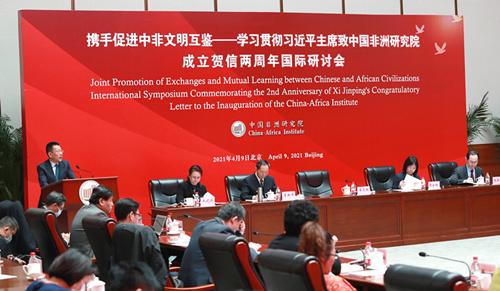
Chinese and African experts shed light on the China-Africa Institute at a symposium on April 9. Photo: Zhu Gaolei/CSST
Chinese and African experts exchanged ideas on the China-Africa Institute at a symposium on April 9. The symposium also commemorates two years since Chinese President Xi Jinping sent a letter to congratulate the inauguration of the China-Africa Institute.
Achievements
Wang Linggui, vice president of the Chinese Academy of Social Sciences (CASS) and president of the China-Africa Institute, pointed out that the congratulatory letter from President Xi summarizes the basic characteristics of changes in the world today, shedding light on the importance of and approach to strengthening Africa studies and boosting China-Africa relations amid major changes unseen in a century.
The establishment of the China-Africa Institute is an important achievement which implements the consensus reached between China and African nations, including the consensus reached at the 2018 Beijing Summit of the Forum on China-Africa Cooperation (FOCAC). It is a new measure that conforms to new trends and requirements in the development of China-Africa relations, Wang said.
Since its establishment two years ago, the China-Africa Institute has made remarkable achievements in advancing research on China-Africa cooperation, building a China-Africa academic exchange platform, opening up a new window for China-Africa communication, and promoting people-to-people connections, Wang noted.
The China-Africa Institute has played an important role in promoting cultural exchanges between China and Africa, said Busani Ngcaweni, principal of the National School of Government (NSG) in South Africa. In June 2020, the NSG and the China-Africa Institute signed a memorandum of understanding on cooperation. The two sides have established a partnership and carried out a series of training programs on economic governance and capacity building.
Up to now, nearly 200 South African civil servants and officials have participated in the training and have greatly benefited from it, Ngcaweni said. In the future, the NSG will continue to strengthen cooperation with the China-Africa Institute in this regard.
Zhang Bo, vice president of the University of Chinese Academy of Social Sciences, said that amid the COVID-19 pandemic, the China-Africa Institute and the University cooperated with the NSG, the Kenya School of Government (KSG), Chinese embassies abroad, embassies of various African countries in China, and other institutions, successfully organizing eight webinars for 348 government officials and scholars from South Africa, Kenya, and Ethiopia.
Way forward
Wang said that in the face of the still severe world situation, the China-Africa Institute will continue to gather resources from academic think tanks in China and Africa, enhance mutual understanding and friendship between the Chinese and African peoples, and strengthen China-Africa cultural exchanges.
The Chinese and African academic circles and think tanks should further strengthen exchanges and cooperation, actively advise and offer suggestions for deepening China-Africa humanities cooperation and exchanges, Wang said. China-Africa joint research projects should be continued, with a focus on the pandemic’s impact on China-Africa cooperation.
“We should further work together to safeguard the common interests of developing countries, promote international anti-pandemic cooperation, and defend multilateralism and fairness and justice around the world,” Wang said.
Capacity building has become a key issue for the FOCAC, and strengthening China-Africa cooperation on capacity building is significant for enhancing human resources throughout the African continent, said Prisca Oluoch, director of linkages and collaborations at KSG.
KSG hopes to strengthen cooperation in teaching and training with CASS and the China-Africa Institute and sign a memorandum of cooperation, Oluoch said.
Add: #5 Jianguomennei Street, Beijing, 100732,P.R.China
Copyright by CASS. All Rights Reserved

